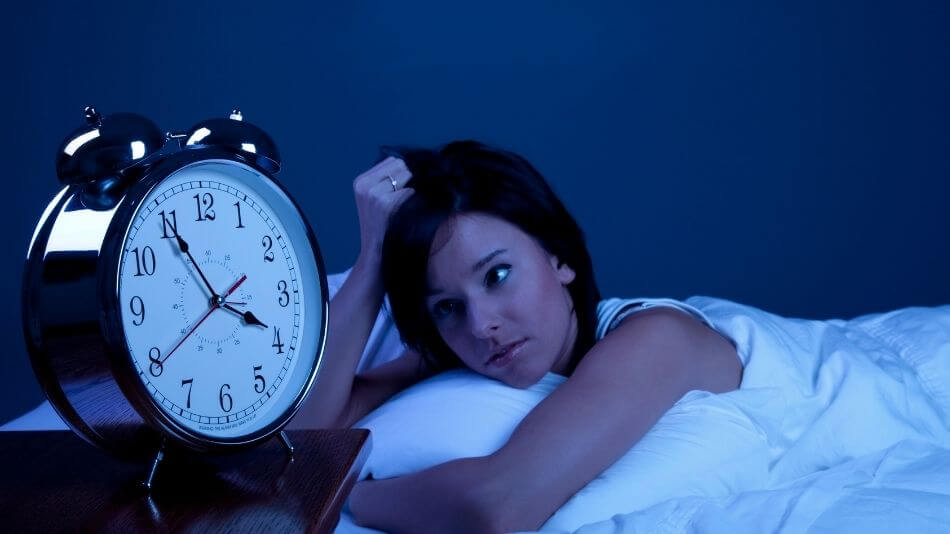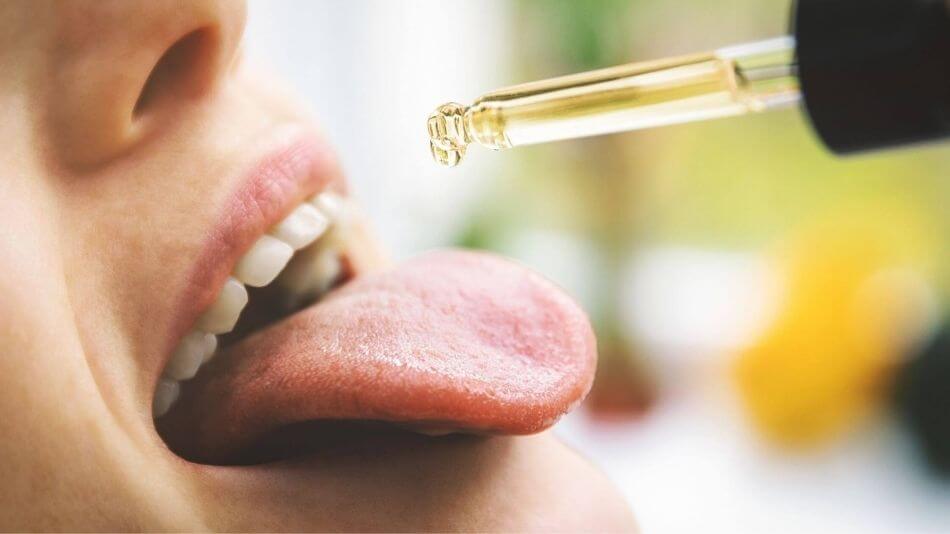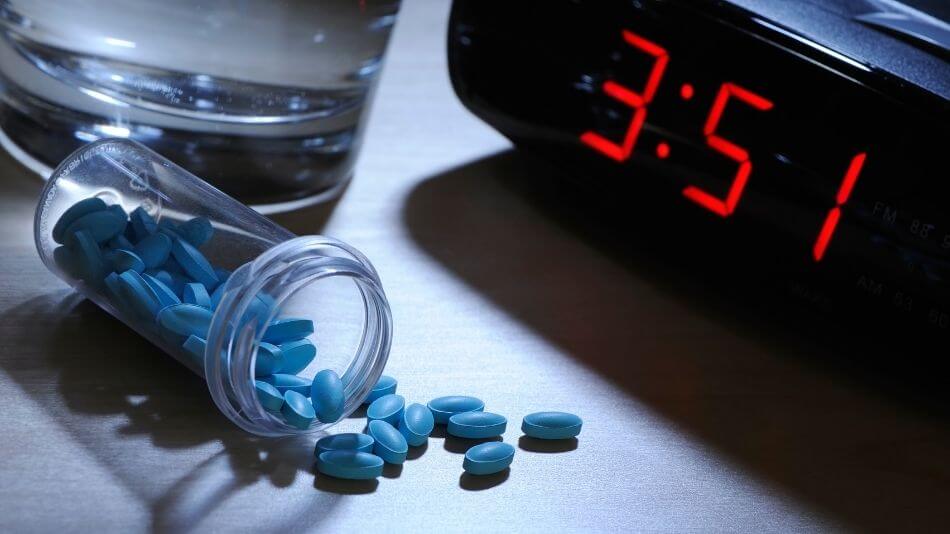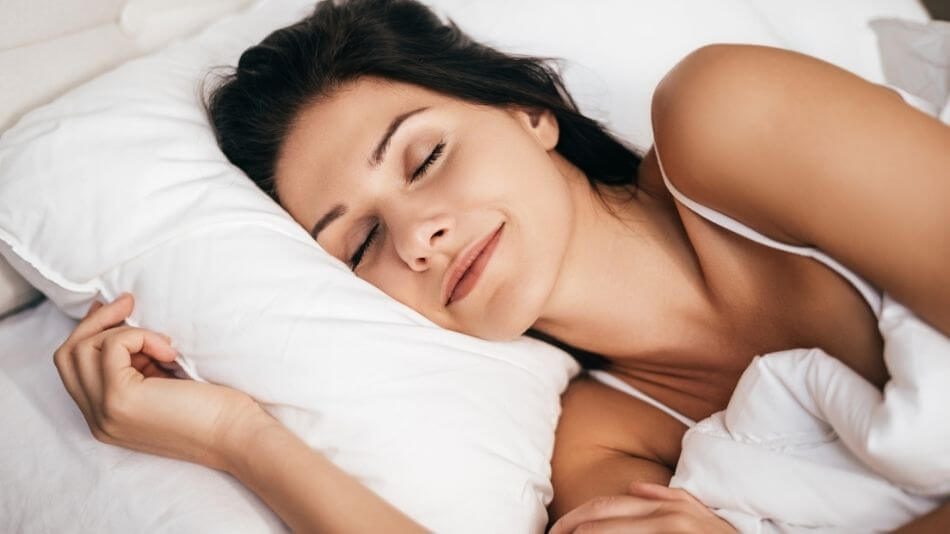Looking for an alternative remedy to heavy-duty sleeping aids? Click here to learn about CBD, how it impacts sleep, and if it can genuinely help you get to bed.
CBD has been shown to effectively treat insomnia if it is caused by anxiety, a major cause of insomnia, but researchers aren’t sure if it can induce sleep independently. It does show promise for treating sleeplessness due to pain, nightmares, and PTSD, however, and may be an effective treatment when used in combination with other behaviors that promote good sleep.
In this article, we’ll review the research on CBD and sleep, CBD’s role in REM sleep, when to take it, how it interacts with other drugs, and if it works well with melatonin.
Current research on CBD and sleep
CBD’s current role in augmenting sleep is not fully known. While we do know that the endocannabinoid system helps to moderate rest, the research is still somewhat uncertain as to how exactly cannabinoids like CBD and THC fit into that and what the endocannabinoid system’s role is in sleep specifically.
However, here is what we do know, or at least what scientists suspect about CBD’s role in sleep and treating insomnia:
CBD, anxiety, and sleep
One of the more considerable ways that CBD helps with sleep is through CBD’s impact on anxiety. The anxiety-relief benefits are some of CBD’s most well-known qualities, and anxiety is one of the primary reasons consumers look into CBD.
The link between anxiety and sleep is both long-observed and well-demonstrated. When an individual experiences anxiety or any type of stress response, their body engages in a state of heightened awareness as though you were reacting to danger. Although it may not seem like it, your body is preparing itself for you to either fight or flee to save yourself from a threat. Many different hormones are suddenly released into your body meant to make you stronger, faster, and more awake. These same hormones may also trigger unpleasant bodily sensations, like muscle tension and stomach problems. While this is an excellent system for saving humans from predators out in the wild, anxiety can unfortunately be a huge obstacle to getting the sleep you need. Recent research suggests that anxiety may even impact you even while you’re sleeping.
Anxiety before bed has been linked to disturbances in a person’s REM cycle, including a higher likelihood of vivid and unpleasant nightmares. These can make falling asleep difficult by generating apprehension around the thought of going to sleep, in addition to causing individuals with anxiety to wake up in the middle of the night, and also potentially causing sleep to be less restful.
Fortunately, CBD is a very effective treatment for anxiety. A wide variety of human studies have demonstrated these effects, including some that have pitted CBD’s anxiolytic effects against its ability to induce sleep. CBD has been shown time and time again to be well-tolerated and able to reduce stress, anxiety, and worry in the short term. The compound even shows vast potential as a candidate for treating anxiety disorders.
However, it’s unclear whether CBD’s beneficial impact on sleep results from any pro-sleep qualities of CBD or if it is only because CBD is an effective anti-anxiety treatment. A few studies have suggested this, such as one study that demonstrated that CBD could positively affect REM sleep but not non-REM sleep. REM sleep is primarily impacted by anxiety-related sleep disturbances, so there may be an indication that CBD’s most significant impact on insomnia applies only when that insomnia is caused by stress or anxiety.
While this may seem like a minor distinction, it’s important to note that this can have some important implications for those who might choose to use CBD for sleeplessness. For instance, CBD’s anxiolytic effect can be a huge benefit for individuals who suffer from anxiety-based sleep disturbances or for those who are too stressed to sleep. However, anxiety is not the only cause of chronic insomnia and other sleep disorders, and it may be ineffective at treating sleep disorders that stem from other, non-anxiety-related issues.

CBD and various sleep disorders
Though CBD has not shown itself to be a cure-all for all sleep disturbances, it may still have a beneficial impact on sleep disorders and disruptions that are not simply anxiety-based.
CBD and PTSD
For example, CBD in combination with THC may offer relief to individuals with PTSD who have unpleasant dreams and nightmares, as THC has been shown to shorten REM sleep, which limits the amount of dream time per night. People struggling with night terrors may benefit from the use of CBD and THC because together, the compounds cut down the amount of time you spend dreaming per night.
CBD and Pain
Finally, insomnia caused by pain might be remedied by CBD since CBD has powerful pain-relieving effects. Sleep issues are widespread in individuals affected by chronic pain, including conditions like cancers, endometriosis, fibromyalgia, and others, and pain is one of the most significant contributing factors to insomnia. For this reason, CBD offers promise as a helpful sleep aid when taken alongside other healthy habits, like avoiding caffeine, limiting stress, and creating a pleasant sleep atmosphere for yourself.
Ultimately, it may be up to you to individually decide if CBD is the sleep supplement for you, rather than these handfuls of studies. Most of these studies are preclinical animal studies or small-scale, which is not the same as decisive evidence in favor of CBD as a sleep aid or against CBD as a sleep aid. Many individuals report success with CBD for sleep anecdotally, and while anecdotes are not the same as data, they do count for something when it comes to finding a personal care routine that works for you.
In summary:
- While the endocannabinoid system helps regulate sleep, we don’t fully know the role of compounds like CBD in augmenting sleep.
- CBD helps with anxiety. That is why CBD can help with insomnia considering anxiety is one of the most common causes of sleeplessness — the fight-or-flight response makes your body wired and aware rather than calm and restful.
- Anxiety may also contribute to nightmares, which can further cause issues with getting to sleep, sleeping through the night, and being fully rested while sleeping.
- CBD’s benefits to sleep may only come from anxiety’s detrimental relationship to sleep, however, which may keep it from being an effective treatment for sleeplessness across the board.
- CBD, combined with THC, also offers benefits to individuals who cannot sleep due to PTSD nightmares, as THC limits time spent dreaming.
- CBD can help ease pain, which may ease insomnia in individuals who cannot sleep due to chronic pain.
- Ultimately, these studies are not especially sturdy or numerous since they are preclinical, so it may be up to consumers to decide what works for them to treat their insomnia.
Does CBD affect REM sleep?
CBD may potentially have an impact on our sleep stages, and researchers have begun to look into its potential in augmenting a type of sleep called rapid eye movement sleep, which is integral to learning, memory, and dreaming.
To determine how CBD impacts our sleep structure, it’s essential to learn the phases of sleep we go through throughout the night to understand how changes to these stages can affect the way we sleep.
The stages of sleep
Non-REM sleep
Non-REM sleep is the phase of sleep during which your body repairs and grows many of the structures inside your body, which is why adequate sleep is vital for children’s development. NREM helps build bone, muscle, tissue and bolster the immune system’s strength. This phase also includes “deep sleep,” which means that your brain activity decreases while you are in this phase.
NREM sleep has three distinct phases:
- Stage one:
In this stage, you are sleeping very lightly. Your body has just begun to slow down to prepare you for sleep. If woken up during this stage, you may say that you didn’t even feel as though you were sleeping, but rather just resting your eyes.
- Stage two:
In this stage, your body has slowed down your brain waves, stopped all eye movements, and has slowed your heartbeat. However, your muscles may still be contracting and relaxing.
- Stage three:
In this stage, your body has entered deep sleep. Your muscles will relax, your brain begins to produce prolonged brainwaves, and your eyes do not move at all. When in stage three, you will be the hardest to wake.
REM sleep
REM sleep is just as crucial as NREM sleep as it is the phase of sleep during which your brain is the most actively engaged. Your brain activity in this stage resembles your brain activity while you are awake. REM sleep is where your most vivid dreams occur and also where your memories are reconstituted, processed, and stored.
REM is vital for learning and memory, and it can have a tremendous impact on your ability to recall events and skills over time if you skip out on REM sleep consistently. Several substances and behaviors can impact REM sleep, including:
- Drinking alcohol before bed
- Taking certain medications
- Smoking heavily
These behaviors may contribute to waking up and feeling groggy, inattentive, or poorly rested.
CBD and REM
Research on CBD’s impact on the architecture of your sleep — that is, its impact on stages 1, 2, and 3 of non-REM sleep and REM sleep — is currently in very early stages, as is much of the research on CBD. Additionally, many studies offer conflicting reports on CBD’s impact on REM and non-REM sleep. Some studies indicate that CBD can protect REM sleep, while others claim that CBD has little to no effect on sleep habits, let alone the architecture of your sleep.
In one study, researchers found that CBD can protect REM sleep from anxiety-induced disturbances, allowing it to carry out its entire course without disruption. However, CBD had no impact on NREM sleep.
By contrast, a 2018 study concluded that there was no significant difference in sleep activity and sleep architecture between healthy individuals who took CBD for sleep and those who took a placebo. Of course, it is a small study of only 27 people, and the individuals tested in this study likely did not have acute sleep impairments nor anxiety.
The results found from this study are not necessarily a complete write-off of the potential for CBD to alter sleep architecture and certainly not enough to write off CBD’s potential as a sleep aid altogether. Consider, for example, the sleep-altering effects of other cannabinoids, like THC, which is known sometimes to lower the amount of REM sleep that users may get while sleeping and induce deep sleep.

In summary:
- When we sleep, we go through several different stages of sleep, each with slightly different characteristics.
- Sleep consists of two main phases: REM (rapid eye movement) sleep and non-REM sleep.
- NREM sleep helps your body repair itself and grow. NREM consists of three different sub-phases, all of which become progressively deeper and more restful types of sleep.
- REM sleep is characterized by lots of brain activity and intense, vivid dreaming. REM is the phase where your brain stores memories and learns.
- It is uncertain how much CBD impacts REM sleep.
- One study indicated that CBD could protect REM sleep from disturbances. Another study suggested that CBD has no impact on sleep at all.
- However, CBD in combination with THC may be able to lower the amount of REM sleep a user gets. This could be helpful for people who deal with serious nightmares by limiting the amount of time they spend in a dream state.
When to take CBD oil for sleep
If you’re interested in using CBD as a sleeping aid, it can be essential to learn scheduling techniques, such as when to take CBD in relation to your sleep habits. Fortunately, CBD comes in a variety of forms, all of which have varying onset times.
Oral administration
While oral administration is one of the most popular ways of using CBD, covering CBD products such as softgels, edibles, and oils, it is also one of the slower administration methods. Taking CBD orally means that you need to wait for your body to process and metabolize your CBD supplement through your liver and gut wall first before it reaches systemic circulation. That can take a while and it can rob your product of some of its potency. However, CBD edibles are effortless to administer and you can easily incorporate CBD edibles into a nighttime routine.
Oral use for CBD takes anywhere from one to two hours to begin working. This means that you can potentially plan ahead by making yourself a nighttime CBD drink, like CBD tea or hot milk, as a part of your nighttime routine.
Sublingual administration
Sublingual administration is one of the faster ways to administer CBD. When CBD is absorbed under the tongue, it can bypass the metabolism of the gut wall and liver that bogs down orally administered CBD. Instead, your body absorbs the CBD through the mouth wall, and it enters systemic circulation quite rapidly, meaning that you will feel the effects of the CBD very readily.
If you are absorbing CBD under the tongue, it should take between ten minutes and an hour to begin working. Since this method is a bit faster than the oral route, it may be a delivery method that works well to take as soon as you begin to wind down for bed. To do so, just place the CBD oil under your tongue, hold it there for 30 seconds to 2 minutes, and then spit or swallow the excess.
Inhalation
Inhalation is hands-down the fastest method for using CBD, other than potentially through intravenous injection (which is, of course, only hypothetical — you’d be hard-pressed to find a doctor who administers CBD injections). Your lungs are very permeable and can get CBD into systemic circulation quickly due to the lungs’ connection with the blood and the rest of your cardiovascular system. It also does not have to wait very long to be processed in the body, unlike orally administered supplements.
Inhalation should take anywhere from 5-30 minutes to begin working, depending on your method. It’s a great way to quickly get yourself feeling restful if you’ve decided you want to get to bed ASAP. You could incorporate it into your bedtime routine by smoking CBD flower, vaping CBD, or hitting a dab rig right before bed.
Topicals
Although CBD topicals such as ointments and lotions will never reach systemic circulation to create any sleep-inducing effects, if CBD has any at all, they may still provide some relief to CBD users who have pain at the root of their insomnia. In this case, it can be beneficial to apply a topical to any spots of localized pain before you head to bed to ensure no tossing and turning when you finally lie down to rest.
Topicals should take about an hour to two hours to begin working, so it might be helpful to apply your ointments about an hour and a half before going to sleep. While applying topicals may be a little more involved than simply taking a pill or vaping, this is easy enough to work into a nightly shower routine or pre-bedtime self-care ritual.
A note on CBD onset
While these can serve as good guidelines for when to take your CBD, wait times can differ in reality based on various factors, including your weight, frequency of CBD use, and caloric intake, among other factors.
If you’re looking to take CBD for sleep but are worried about how it might affect you and how long it might take the first time, consider trying CBD for sleep at a time when you are not stressed about having to get up or fall asleep on time. That way, you can have a picture of how long it takes to fall asleep before you’re suddenly in a crunch.
In summary:
- Orally administered CBD should take between one hour to two hours to kick in.
- Sublingually administered CBD should take between ten minutes to one hour to kick in.
- Inhaled CBD should take between five to thirty minutes to kick in.
- Topical CBD should take between one hour to two hours to kick in.
- Different methods of CBD consumption have different onset times, which should be noted when you’re looking to use CBD to regulate your sleep cycle.
- CBD onset time can also differ depending on your weight, frequency of use, and caloric intake.
- Make sure to test CBD’s effect on you beforehand to reduce stress. For example, we don’t want you to sleep through your alarm and miss an important meeting.
Can you take CBD oil with sleeping pills?
When taking CBD, you have the potential to encounter a variety of drug interactions. The variety of outcomes is because CBD is metabolized with the same liver enzyme that metabolizes a variety of other drugs. That means that when two compounds are taken side-by-side, CBD could either dampen or amplify the effects of the drug in a way that could be troublesome.
In general, a good rule of thumb is that CBD will likely have the same interactions with medications as grapefruit juice, which interacts with cytochrome P450 drugs. Sleeping pills are frequently included as “do not interact” drugs with P450, as taking CBD in combination can amplify the sedative effects of both compounds to a level that could be unpleasant or even dangerous.
Sleeping pills to avoid while using CBD include, but are not limited to:
- Diazepam (Valium)
- Zolpidem (Ambien)
- Alprazolam (Xanax)

In summary:
- CBD has drug interactions with the same compounds as grapefruit juice. Always heed a grapefruit warning on a label if you are using CBD.
- CBD, in conjunction with sleeping pills, could cause excessive sedation that is uncomfortable or even harmful.
Combining CBD and melatonin for sleep
If you’re looking to take supplements for sleep, CBD and melatonin might be a great match, as CBD’s relaxing effects and melatonin’s proven sleep benefits can combine to give you a good night’s rest.
Melatonin is a naturally-occurring hormone produced by your body to regulate sleep; in individuals without sleep disorders or behaviors that inhibit sleep, melatonin production begins to ramp up in your body about two hours before bedtime until levels reach a concentration that makes you tired enough to drift off to sleep.
However, you can also take melatonin supplements to induce tiredness if you are having short-term difficulties with sleep. Even a tiny amount of melatonin can make you feel tired enough to correct unpleasant sleeping patterns, or help you wake up early in the morning.
Mixing CBD and melatonin is perfectly safe, as CBD does not have any dangerous or significant interactions with melatonin. The only risk is that CBD and melatonin taken together may cause more drowsiness than when taken alone. However, extreme sleepiness may be of benefit to individuals who are looking to see strong effects to induce sleep.
In fact, multiple CBD brands offer specially formulated mixes of CBD and melatonin for nighttime relaxation, which they would not be able to sell if it were unsafe. However, consider consulting a doctor if using melatonin for long-term sleeping issues, as melatonin is not considered a permanent solution to sleeplessness.
Takeaway
CBD offers potential to treat insomnia and sleep disturbances, primarily because it has anti-anxiety effects that can eliminate the stress and worry that often exacerbate insomnia. Additionally, CBD may have the potential to treat other sleep problems, including PTSD-related nightmares and pain-induced insomnia. However, we don’t know if CBD is as effective at inducing good sleep as other sleep medications and supplements or if it’s its anxiolytic behaviors that are making it seem so beneficial to sleep.
CBD may impact REM sleep, the part of sleep which causes vivid dreams and is responsible for memory consolidation, but as of right now, that is uncertain. If taking CBD for rest, remember to plan for the delivery method you choose to avoid waiting and waiting. Avoid taking CBD alongside drugs that may have “grapefruit warnings,” like most sleeping pills, as the way CBD is metabolized can impact how the drug works and potentially induce excessive drowsiness. If CBD is not working on its own, consider using it alongside a supplement like melatonin.
If you’re looking to use CBD for sleep, consider browsing our directory of CBD products, where we offer health-forward items from trustworthy brands across the country. There, you can find topicals, CBD flower, gummies, and CBD oil to help you drift off to sleep with little-to-no worry. Click here to see CBDistillery, our recommendation for CBD gummies for sleep. We’ve personally tried them, and honestly can’t recommend them enough.









